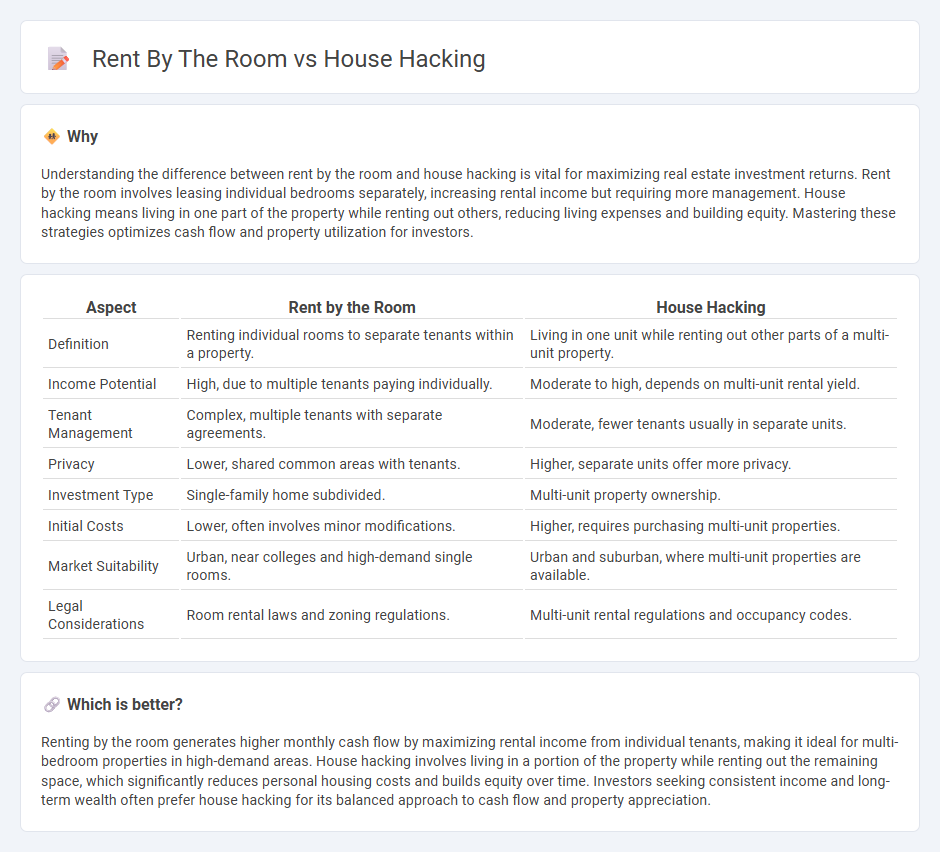
Rent by the room offers landlords higher rental income by leasing individual bedrooms, maximizing space efficiency in multi-bedroom properties. House hacking involves living in one part of a property while renting out other sections, reducing living expenses and building equity. Explore detailed strategies and benefits of rent by the room versus house hacking to optimize your real estate investment.
Why it is important
Understanding the difference between rent by the room and house hacking is vital for maximizing real estate investment returns. Rent by the room involves leasing individual bedrooms separately, increasing rental income but requiring more management. House hacking means living in one part of the property while renting out others, reducing living expenses and building equity. Mastering these strategies optimizes cash flow and property utilization for investors.
Comparison Table
| Aspect | Rent by the Room | House Hacking |
|---|---|---|
| Definition | Renting individual rooms to separate tenants within a property. | Living in one unit while renting out other parts of a multi-unit property. |
| Income Potential | High, due to multiple tenants paying individually. | Moderate to high, depends on multi-unit rental yield. |
| Tenant Management | Complex, multiple tenants with separate agreements. | Moderate, fewer tenants usually in separate units. |
| Privacy | Lower, shared common areas with tenants. | Higher, separate units offer more privacy. |
| Investment Type | Single-family home subdivided. | Multi-unit property ownership. |
| Initial Costs | Lower, often involves minor modifications. | Higher, requires purchasing multi-unit properties. |
| Market Suitability | Urban, near colleges and high-demand single rooms. | Urban and suburban, where multi-unit properties are available. |
| Legal Considerations | Room rental laws and zoning regulations. | Multi-unit rental regulations and occupancy codes. |
Which is better?
Renting by the room generates higher monthly cash flow by maximizing rental income from individual tenants, making it ideal for multi-bedroom properties in high-demand areas. House hacking involves living in a portion of the property while renting out the remaining space, which significantly reduces personal housing costs and builds equity over time. Investors seeking consistent income and long-term wealth often prefer house hacking for its balanced approach to cash flow and property appreciation.
Connection
Rent by the room and house hacking are connected through their shared strategy of maximizing rental income from a single property by leasing individual rooms to multiple tenants. This approach allows property owners to offset mortgage payments and increase cash flow more effectively than renting out the entire home to one tenant. House hacking leverages the concept of rent by the room as a practical tactic to achieve financial benefits and optimize real estate investment returns.
Key Terms
Owner-occupancy
Owner-occupancy in house hacking involves living in one unit of a multi-unit property while renting out the others, maximizing personal space and rental income. Renting by the room typically applies to single-family homes, where the owner rents out individual bedrooms to multiple tenants, often increasing cash flow but requiring more landlord involvement. Explore in-depth comparisons to determine which owner-occupancy strategy aligns best with your investment goals.
Cash flow
House hacking generally offers higher cash flow by allowing owners to live in and rent out portions of their property, minimizing personal housing expenses while generating rental income. Renting by the room can maximize monthly rent but often involves increased management effort and potential vacancy risks, impacting net cash flow. Explore detailed comparisons and real-life examples to determine the best strategy for your investment goals.
Lease agreements
House hacking typically involves a single lease agreement where the owner occupies part of the property while renting out other sections under one contract, offering simplified management and consistent income. In contrast, rent by the room often requires multiple individual lease agreements, which can increase administrative tasks but may allow for higher total rental income due to per-room pricing. Explore further to understand how lease structures impact your rental strategy and legal responsibilities.
Source and External Links
What Is House Hacking In Real Estate? | Quicken Loans - House hacking is a strategy where you generate passive income by living in a property while renting out parts of it, such as spare rooms, multifamily units, or accessory dwelling units, to offset your housing costs.
What is House Hacking? Definition and Strategies - House hacking commonly involves buying a multi-family home, living in one unit, and renting out the others so tenants cover most or all of your mortgage, making it a popular way for millennials and Gen Z to afford homeownership.
What is house hacking and is it something you should be doing? - House hacking includes sharing your home with housemates or building accessory dwelling units to rent out, effectively reducing or eliminating living expenses and possibly beginning a real estate investing career.
 dowidth.com
dowidth.com